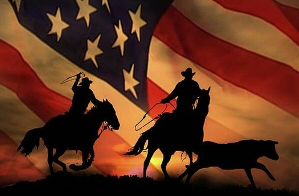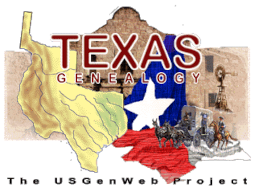BIOGRAPHICAL SKETCHES
Flavius V. Gentry
F. V. Gentry has long been closely identified with the interests of Port Lavaca, and he stands to-day at the head of one of the leading industrial concerns of the county. He is the pioneer fish and oyster shipper of Port Lavaca, and his prestige has been won through marked executive force, keen discrimination, sound judgement and unfaltering energy. He was born in Adair county, Kentucky, February 12, 1840, a son of John B. and Sally O. (King) Gentry, both also natives of that commonwealth, where they were married, reared their family and died. The paternal grandfather, Richard Gentry, was a native of England, but came to the American colonies at an early day and participated in that long and memorable struggle for independence, the Revolutionary war. Later he went to the new Eldorado of Kentucky, where he cast his lot with the early pioneers, and assisted in laying the foundation for its subsequent development. He made a permanent settlement in the Blue Grass state, there reared his family and passed to his final reward, his remains now resting at old Crab Orchard. During the war he was several times wounded in battle, at one time a ball, passing through both hips, embedded a portion of his clothing in the wound. His name was prominently associated with the early history of Kentucky, and he was well known and honored for his many sterling characteristics. In his family were the following children: George, who was one of the early pioneers in Texas, but his residence is not now known; Samuel L., who died in Kentucky; John B., the father of our subject, and Amazon, a daughter who died before marriage.
John B. Gentry was reared among the pioneer scenes of the Blue Grass state, and after his marriage he there located on a farm of his own, where he later built a merchant mill on Little River, continuing its operation successfully for a number of years. During the later years of his life he studied medicine, making a specialty of the disease of the eye, ear, nose and throat and became a talented and successful optician. Some time after the death of his wife, which occurred in 1845, he sold his mill property and located at Frankfort, Kentucky, where he continued in the practice of his profession for many years, dying at the home of his daughter in Richmond, Kentucky, in 1885. During the war of the rebellion he had passed the age to engage in active service, but his sympathies were with the Confederacy, and four of his sons participated in the conflict. During the time he traveled over several of the southern states. In his early manhood Mr. Gentry was a Clay Whig, but later became a strong Crittenden Democrat, and being a fluent and ready speaker he was an active worker in the political campaigns, but never cared for the emoluments or honors of office. He was a consistent and worthy member of the Christian church, an active worker in the cause of Christianity, and was also a member of the Masonic fraternity, widely known and highly respected for his sterling integrity and honor. Mrs. Gentry was a daughter of Richard King, of English descent and an early pioneer in Kentucky, where he was an extensive slave owner and farmer, owning large tracts of land. He became prominently identified with the early history of his adopted state of Kentucky, and his death occurred on his old plantation in that commonwealth. His four children were: Jack, Herbert, Adeline (Mrs. Forbes) and Mrs. Gentry. The following children were born to Mr. and Mrs. Gentry: Richard K., who was a physician, served as a lieutenant in John Morgan's command during the Civil war, in which he saw hard service and was later transferred to a Mississippi command and was killed at the battle of Missionary Ridge; Mary S., now Mrs. T. P. Dudley; Flavius V., whose name introduces this review; Napolean B., who served as captain of a cavalry company in the Confederate army, but later became a recruiting officer for the Federal army, and located at San Francisco, California, where he lost his all in the earthquake of 1906, and is now conducting a fish and oyster plant in Rockport, Texas, in the interest of his brother Flavius; John B., who also served in the Confederate service during the Civil war and was killed in Louisiana.
Flavius V. Gentry spent the early years of his life in his native commonwealth of Kentucky, but being a delicate youth he was indulgently reared and for a short period clerked in a store. It was not until after his services in the Civil war that he gained his strength, having enlisted in 1861 in Company K, Sixth Kentucky, Volunteer Infantry, under Colonel J. B. Lewis, and was consigned to the Army of the Tennessee in J. C. Breckenridge's Division and Roger Hanson's Brigade, with old General Bragg in command. His first battle was at Little Spanish on Brier creek, and after the engagement at Donalson he received an honorable discharge on account of disability and went to Athens, Tennessee, where he remained until his health was restored, when he entered the headquarter's department. At the battle of Cynthiana, Kentucky, he was made a prisoner of war, and was detained at Louisville, that state, until the close of the struggle. During his military career he was often in the thickest of the fight, undergoing the hardships and deprivations which are the common lot of the soldier, but he only received some slight flesh wounds and returned from the service stronger than ever before.
Remaining at home for a short time after his return, Mr. Gentry then spent one year in Cuba, and in 1869 came to Indianola, Texas, and engaged in the hide and wool business for two years, on the expiration of which period he went to Victoria and resumed the same occupation, and in 1882 went west to embark in prospecting and mining. After two years spent in the west he returned to Victoria, Texas, and resumed the hide and wool business, thus continuing successfully until 1890, when he came to Port Lavaca and opened the fish and oyster business in which he has since become so well known, but his operations were begun in a small way, gradually increasing his operations until he now stands at the head of one of the leading industries of the kind in this section of the state, his trade extending throughout the entire northwest, old and New Mexico and in many other sections of the Union. His sales now aggregate nearly one hundred thousand dollars annually and he furnishes employment to about four hundred men, many of them the heads of large families in Port Lavaca. He also has about forty sailboats in the service, and in 1905 he started a branch institution at Rockport, Texas, the business of which is also rapidly increasing and now furnishes employment to about seventy-five men. He also has a large plant on the beach in Port Lavaca, also large warehouses with railroad switches for the shipping of his product, and his business is under the supervision of six competent men, which relieves Mr. Gentry of much hard labor and close confinement. He has always retained his hide and wool business, and has invested a portion of his surplus money in farms, which he rents, and finds this a profitable source of income. He also owns numerous rental properties in the city, and is agent for the Waters Pierce Oil Company, a stockholder in the Cotton Gin Company and was president of the Port Lavaca Pavillion Company for the entertaining of excursionists. His beautiful and commodious residence overlooking the bay is of modern architecture and is one of the lovely homes of the city.
In 1873 Mr. Gentry was united in marriage to Miss Emma Hall, who was born in Victoria, Texas, June 26, 1853, a daughter of Addison F. and Rebecca (Jones) Hall, both natives of Kentucky. After their marriage they came to Texas in 1851, where after traveling through many places they finally located at Victoria. The father, who was a carpenter and contractor, greatly assisted in the building up of that city, and later he was engaged in the hotel business for a number of years, becoming widely known throughout his community and commanding the respect and confidence of all with whom he had dealings. His death occurred in Victoria in 1886, a consistent and worthy member of the Baptist church, as was also his wife, whose death occurred of yellow fever in 1863. Mrs. Gentry was their only child, and she too was a devout member of the Baptist church, an earnest Christian worker and a devoted and loving wife. She was called to the home beyond on the 7th of February, 1905, dying without issue. Mr. Gentry is a stanch Democrat in his political affiliations, and was twice elected mayor of Port Lavaca, his administration therein being characterized by devotion to its interests and upbuilding. The people, however, became dissatisfied with the needed improvements which he instituted, and finally voted the corporate charter out of existence. He is enterprising and public spirited to a high degree, broad minded and intelligent, and Port Lavaca is greatly indebted to him for the interest he has taken in her welfare and for the large institutions which he has inaugurated and which have so greatly enhanced its welfare. In his fraternal relations he is a member of the Independent Order of Odd Fellows and the Benevolent and Protective Order of Elks.
Source: Transcription from the book, A Twentieth Century History of Southwest Texas, volume II, published in 1907; located on the website, Hathitrust Digital Library (http://www.hathitrust.org), accessed on 17 September 2022.



